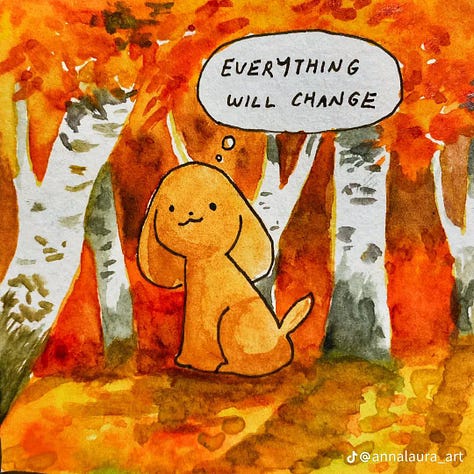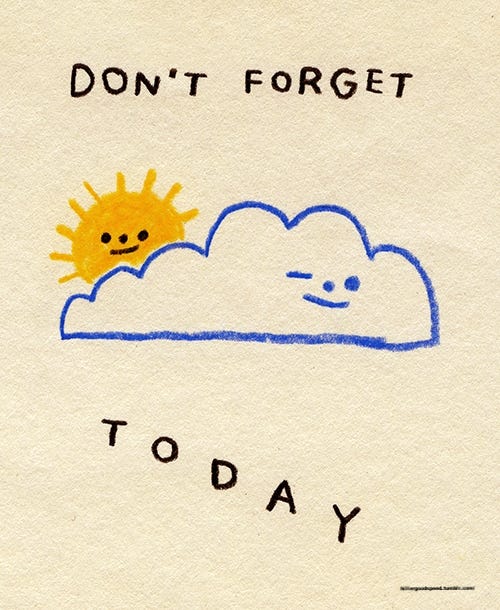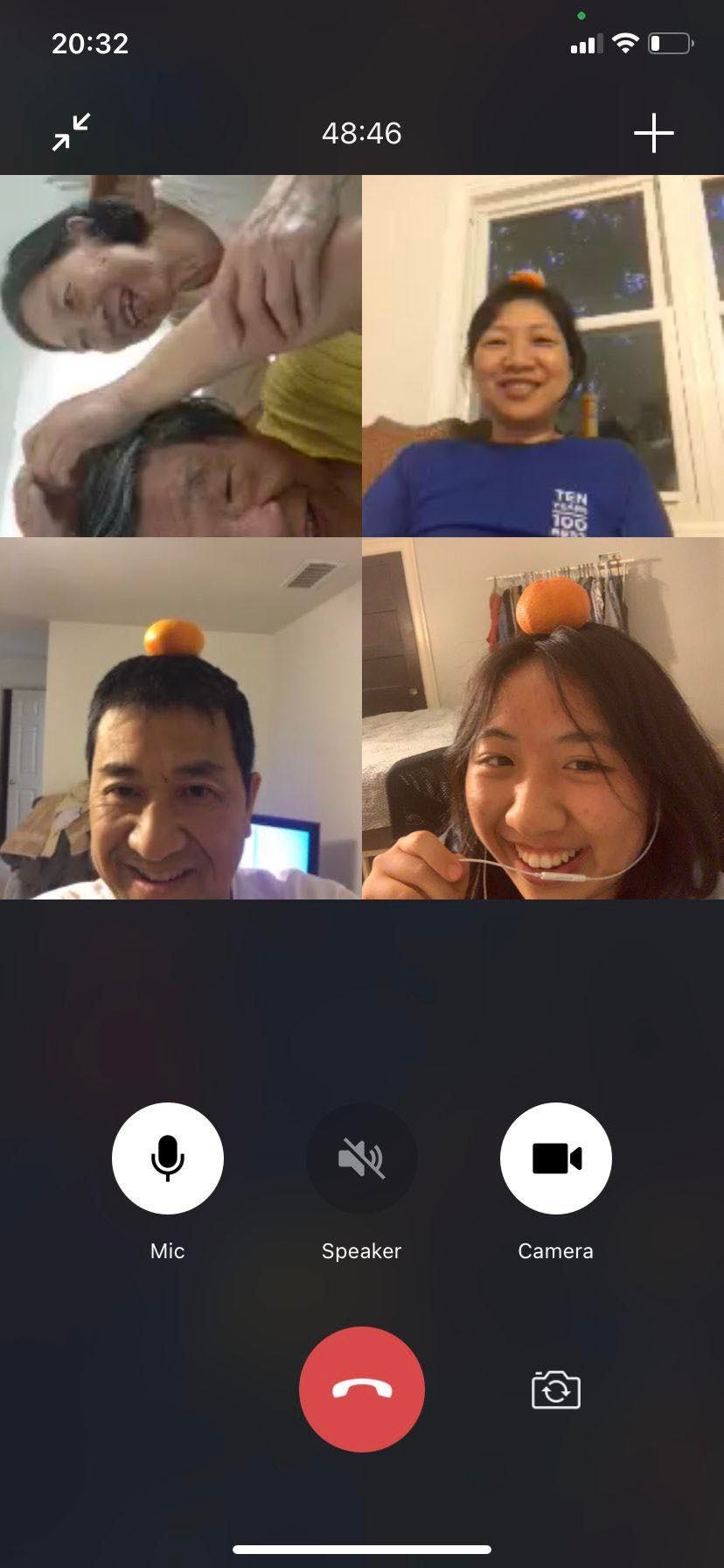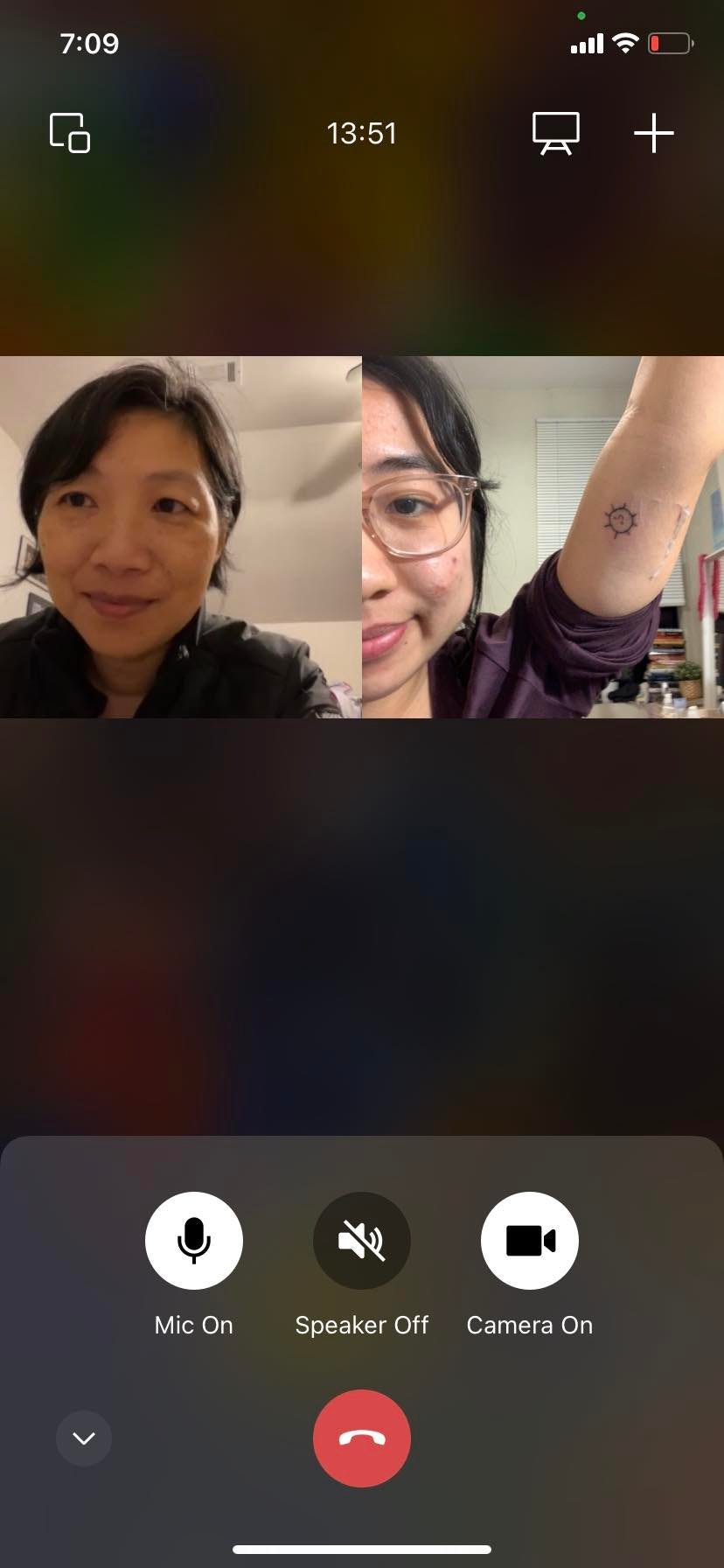oh, earth, you’re too wonderful for anybody to realize you
*insert tik tok slideshow with quotes/art on abrupt endings*
This year, I celebrated my first New Year’s Eve — like, really did something instead of falling asleep at 11:30 p.m. and being woken up by my family to watch the Times Square ball drop on TV. Two of my friends from college visited and we went to a Smiths cover band in Gowanus (I love the Smiths, I’m not like other girls, etc) and a New Year’s Eve party. It was epic. Holidays have never been a big deal for me growing up, but since the pandemic began, I’ve been thinking about how unpredictable everything is—some things we try to plan and commemorate, but there’s always a chance of it being the last time we do something. For over a year, COVID delayed graduations, weddings, and other big ceremonies. I planned to celebrate the Fourth of July by watching fireworks but couldn’t because I unexpectedly caught COVID. Instead, I organized my emails and planned for my retirement (nothing more liberating than that). Though most things do happen according to plan, sometimes things end abruptly and without a clear sense of closure.
I moved to Georgia the summer after middle school, and I remember my last day of 8th grade feeling almost like any other school day—final exams were over and people were gifting each other presents before leaving for the summer. I remember asking a friend (more like a friendly acquaintance) a question, knowing this would probably be the last time I saw her again. “Do you know where [ ] is?” She asked, distracted by the other drama in her life. I said I didn’t know and she walked away, in search of her friend. That was the last time I saw her.
A year after living in Georgia, I moved to North Carolina. My last day there was mostly unmemorable — getting boba at the HMart strip mall walking distance from my school (part of a weekly tradition where I lied to my parents about having Mock Trial practice and hanging out with my friends after school instead) and anxiously comparing answers from final exams to estimate our exam scores.
In the autographs section of my yearbooks, people scribble the words “HAGS” with practiced signatures and inside jokes, some of which have not aged well (I will cancel 3 white people who have made jokes about me being ‘their favorite Asian’ if someone Venmos me $5 (…kidding)). We graduated and said our goodbyes. My middle school principal made our graduation Beatles themed. I had known this was going to be the last time I saw some of these people.
The first time I ended things with my on-off college relationship, I told him we shouldn’t be in touch anymore and then, not wanting to sound too bitter about the very bitter breakup, I told him, “Have a good summer.” I thought this was going to be the last time I spoke to him. I don’t know why, but I’ve made it a tradition since to end things with people/jobs/etc by telling them HAGS (sometimes, not that wording exactly — it’s adjusted for seasonality and appropriateness: hope everything goes well, have a good move).
Honestly, I think it’s a control thing. I used to be an INFJ (now I’m an ENFP but, apologetically, I am still a little bit of a Myers Briggs girly). I loved to plan out my life. In middle school, when bored during class lectures, I would write out estimates on how long each homework assignment would take to complete in my planner. I even planned out itineraries for trips I didn’t take for fun. In theory, I’d like to know everything that ever happens in the future and that everything will be okay (I’m not generally pessimistic, but I disagree with this phrase in a similar way that I disagree with the assumption that progress is inevitable).
My senior year of college was abruptly ended because of the coronavirus pandemic. We were on spring break. I was in New York and new cases were being reported daily. I fled to visit my brother in Philadelphia and my spring break got extended to two weeks. Classes went online and I went back to Chapel Hill, NC to pick up a few items from my room, thinking I would be back in a month or so until the month became three years and counting. I remember thinking my parents were being silly when they talked about COVID with such concern in January that year. Before leaving for spring break, I made plans to get meals with people once I returned. I think this is how a lot of these things work — everyone thinks it happens to other people, until it happens to them too.
Overall, I was pretty lucky. I lived with my parents for a year after the pandemic and worked remotely (which saved me from an otherwise 3+ hour daily commute). No one in my family had gotten COVID before vaccinations were available, and I got a lot closer to my family. I started taking walks and caught up with friends on Zoom calls. But, everything had ended so abruptly. It was the last time I would see or talk to so many people I took for granted. I was so excited for spring break to start, I didn’t realize it would be the last time I would ever sit in a lecture hall (this is my announcement that I will never go to law school). I had spent so much time thinking and worrying about frivolous things that are unmemorable now.
**Warning, light spoilers ahead on the movie Aftersun, skip this paragraph to avoid**
Recently I watched the movie Aftersun. Viewers follow the perspective of a woman looking back at her final memories with her dad who died by suicide when she was a girl. While watching it, you see scenes of her and her dad doing mundane things like buying rugs, eating dinner and swimming. The entire time, you feel like something bad is about to happen but you don’t know what exactly until the end of the film. Looking back, you take note of subtle lines in the film, like him saying he couldn’t have imagined himself living past 30 or the look of sadness on his face when she asks her dad what he imagined himself doing now at age 11. You see traces of this when he takes big risks and spends his money recklessly. Still, the suicide feels unexpected.
In May 2020, my friends had a brief reunion in Chapel Hill since many of us were moving out of our college housing. We took a lot of walks and met in nature while socially distanced. I thought I would see them a lot more and in a different context, one that didn’t involve a pandemic that shut down my university for weeks. We had still planned to go to Golden Corral together before graduating, but that has been postponed because we were living in Unprecedented Times TM. One of my friends shared the poem “Limits” by Jorge Luis Borges with me:
Of all the streets that blur in to the sunset, There must be one (which, I am not sure) That I by now have walked for the last time Without guessing it, the pawn of that SomeoneWho fixes in advance omnipotent laws, Sets up a secret and unwavering scale for all the shadows, dreams, and forms Woven into the texture of this life.If there is a limit to all things and a measure And a last time and nothing more and forgetfulness, Who will tell us to whom in this house We without knowing it have said farewell?Through the dawning window night withdraws And among the stacked books which throw Irregular shadows on the dim table, There must be one which I will never read.There is in the South more than one worn gate, With its cement urns and planted cactus, Which is already forbidden to my entry, Inaccessible, as in a lithograph.There is a door you have closed forever And some mirror is expecting you in vain; To you the crossroads seem wide open, Yet watching you, four-faced, is a Janus.There is among all your memories one Which has now been lost beyond recall. You will not be seen going down to that fountain Neither by white sun nor by yellow moon.You will never recapture what the Persian Said in his language woven with birds and roses, When, in the sunset, before the light disperses, You wish to give words to unforgettable things.And the steadily flowing Rhone and the lake, All that vast yesterday over which today I bend? They will be as lost as Carthage, Scourged by the Romans with fire and salt.At dawn I seem to hear the turbulent Murmur of crowds milling and fading away; They are all I have been loved by, forgotten by; Space, time, and Borges now are leaving me.
Recently, I’ve been revisiting the same headspace I was in when coronavirus began spreading in the US. There are a few things that have happened in the past two weeks for me — one is that my grandpa is having health complications because of COVID. He’s wavering between being better and not. One day China was following zero COVID and the next my grandpa had caught COVID at the hospital and COVID was everywhere. I had been wanting to learn Mandarin for awhile now so I can better communicate with him, but I’ve prioritized other things over it and have taken an accidental 4 month hiatus. I put it off, thinking there would always be more time to learn (and there might be!). He helped raise me as a kid, when I actually did know Chinese, but since living in separate countries and my Mandarin deteriorating, we’ve grown apart. I thought he was doing well because for the first 8 days, he only had mild symptoms. But since then, it’s been getting both better and worse with unpredictability. In 2021/2, I had made more of an effort to call my grandparents on WeChat. The effort isn’t that large — I called them monthly which was way more than before when it would only be for major holidays. I remember sometimes wishing I could do other things—like assignments or reading or talking to my friends—instead because it always felt like my grandparents would be there when I returned.
**Warning, light spoilers ahead on the book Stay True, skip this paragraph to avoid**
In December I also read Hua Hsu’s Stay True and attended a Time to Say Goodbye Q&A on it at NYU. At the Q&A, Hsu discusses his relationship with his parents. As a kid, he was too focused on figuring out how to live in and make sense of America to realize that his parents were doing the same. He talks about how children can be self centered and forget about the perspectives of their parents (which is okay because they are kids and so much younger than their parents). It isn’t until later in adulthood, when they experience some of the same things that they realize how their parents are feeling and thinking. As a kid, being like your parents is corny. They’re only cool when you start to become more and more like them in adulthood. In Aftersun, the daughter calls out her dad for spending money he doesn’t have. She is sometimes angry and disappointed with him and she doesn’t know this will be one of her last memories with her father. Maybe part of being a kid is taking your parents for granted and losing patience with them. In a similar vein, I think part of being human is taking things for granted even though you shouldn’t.
I read the play Our Town in 8th grade. The author describes it as “an attempt to find a value above all price for the smallest events in our daily life.” I remember the lines, “It goes so fast. We don’t have time to look at one another. … Oh, earth, you’re too wonderful for anybody to realize you. … Do any human beings ever realize life while they live it?—every, every minute?” I picked up the book again at a used book store my freshman year of college and have read it again a few times as an adult. Though I thought it was a great play in middle school, it feels even more meaningful and important the older I get. Life is constantly changing, mostly abruptly and unpredictably, but as much as it can mean the end to good things, which are often small and mundane (#JustLittleThings), it also brings in new good things. I was reminded of this via a TikTok slideshow.






I still carry some of my old tendencies of always wanting to predict the future and making sure that everything will be okay, but I’m not as rigid anymore. Even though I planned out all my assignments in high school, I was a straight B student and it seemed to be that way no matter how hard I studied for things. Ironically, in college when I studied even less, my grades improved drastically. Instead of trying to control everything, I’ve just been trying to observe and appreciate moments as they happen. I’m still not perfect at it and good things ending still make me sad. Lately, I’ve been getting into poetry again for the first time since high school. I’ve been rereading some of the books I loved in high school and trying to keep track of what I do everyday. TikToks don’t seem to hold my attention as much as they once did. For better or worse, the frivolous things have stopped mattering so much.
Extras:
This week, I finally got a tattoo after thinking about it since high school. It’s a Hiller Goodspeed illustration of a sun with a smiley face (it’s not an exact illustration - I face swapped one of his smileys from a flower with the sun’s). I’m not sure if I want to assign complete meaning to it, but for now, to me, it’s a reminder to have a good summer and the above things discussed in this Substack — about appreciating things despite them having an unknown end. I showed it to my mom and she asked me if it was painful. Luckily, she was okay with it.
A year and a half later, I’m still obsessed with this op-doc from NYT called H.A.G.S.
Thinking more about art through this review of the Whitney biennial and Maggie Nelson’s chapter “Art Song'“ in On Freedom
I also wrote about mental health apps and capitalism for Kernel Magazine earlier in 2022.
My two favorite books I read in 2022 are Happy Hour by Marlowe Granados (I’d describe it as New York City Sally Rooney for poor POC) and New Waves by Kevin Nguyen (would esp. rec this to people who have worked for silly startups) (and if you like New Waves, you might also like this piece in Kernel about relationships and chatbots that can optimize being a good partner that absolutely wrecked me).
Michelle Bao on Anzec Biscuits: “I'm an investigative reporter trying to get to the bottom of the story that I care about the most – myself – but oops, the story turns out to be bottomless in a world where everything is tracked, has some bottom, and I keep falling and falling. The limits of the mind, the presentness of the past, the softness of memory, it's not such a bad thing.”
My friend thought the title of this post was a “Sally Rooney ass title” so I just had to insert this quote I am obsessed with from Beautiful World, Where Are You that relates to it: “What if the meaning of life on earth is not eternal progress toward some unspecified goal—the engineering and production of more and more powerful technologies, the development of more and more complex and abstruse cultural forms? What if these things just rise and recede naturally, like tides, while the meaning of life remains the same always—just to live and be with other people?”
Jasmine Sun’s latest Substack: “I saved a TikTok of a girl explaining her concept of the “fatal flaw.” I think it’s genius. It goes like this: every close friend gets one fatal flaw. Maybe they’re always late, maybe they can’t keep secrets, maybe they ghost every guy they meet. The rule is that you can’t hold that thing against them. If it’s intolerably serious, you stop being friends, but otherwise, you forgive and accept. I love this idea because it reflects how I believe people really are—a mostly stable package of good and bad that you can buy wholesale, or not at all. I have another working theory that you know you love someone when each new weakness uncovered no longer changes how you feel. Time and trust can turn any blemish into a beauty mark. It’s then that knowing and loving are not so far apart.”




